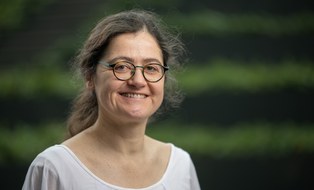Daniela Hartmann
 © Sven Ellger/TUD
© Sven Ellger/TUD
Wissenschaftliche Mitarbeiterin
NameDr. Daniela Hartmann
Eine verschlüsselte E-Mail über das SecureMail-Portal versenden (nur für TUD-externe Personen).
Application of Whole Cell Biosensors for Identifying Streptomyces spp. as Sources for Novel Polyene Antibiotics
Antibiotic resistant microbes are on the rise and pose one of the biggest public health challenges of our times. In times of so-called superbugs, which are resistant even against the antibiotics of last resort, new antimicrobial compounds are direly needed to combat these germs. But the progress in developing new drugs is slow and the pipelines are almost dried out. Even after decades of successful exploitation, filamentous, soil bacteria from the genus Streptomyces spp. are still very important potential sources for new antibiotics because of the richness and diversity of their secondary metabolism. But novel approaches are require to tap this rich source, in order to identify new compounds. A promising – and underappreciated – approach is the use of compound- or target-specific whole cell biosensors; bacteria that give an easily quantifiable and specific reporter output in response to exposure to a specific chemical compound. Here, we screened a collection of Streptomyces soil isolates for induction of a novel amphotericin B-specific biosensor. One isolate that gave rise to a strong and specific signal was chosen for subsequent in-depth analyses. Multi-locus sequence typing and whole genome sequencing was applied and a draft genome sequences for this new isolate of Streptomyces sp. #4/1 was obtained. The genome reconstruction was conducted with reference-guided de novo assembly approach and enabled the allocation to an unclassified species Streptomyces sp. M3 (RefSeq GCF_004125315.1). Comprehensive genome mining was performed for identifying antibiotic biosynthesis clusters and five potential candidate clusters that might encode polyene biosynthesis pathways were identified. After optimization of the growth conditions, active cell extracts were generated and further analyzed for isolation and characterization of the corresponding compounds. Our approach demonstrates the power and efficiency of combining whole cell biosensors with genome mining for identifying new antibiotics.
Since 2017
PhD Student, General Microbiology, Institute of Microbiology, TU Dresden
2014 – 2017
Master of Science degree in Biology at Technische Universität Dresden (TUD) in Dresden, Germany; Master Thesis: Characterization of antibiotics-producing Streptomyces from the soil and their interaction with Bacillus subtilis
2008 – 2014
Bachelor of Science degree in Molecular Biotechnology at Technische Universität Dresden (TUD) in Dresden, Germany; Bachelor Thesis: Characterization of a novel endophytic fungus from the Aster tataricus
2006 – 2012
Nursing volunteer
2000 – 2006
Diploma degree in Business administration at University of Applied Science (HTW) in Dresden, Germany; Diploma Thesis: Corporate Culture and Leadership - Impacts of an unacceptable management style on the absenteeism of employees
in progress....
